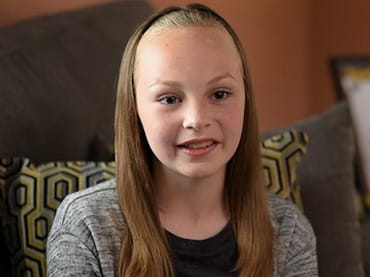The Challenge: A Concussion From a Kick to the Head
On a warm September day, 11-year-old Chelsea was playing sweeper on her club travel soccer team. While defending two shooters, she got pushed down, and her head landed near the soccer ball.
An opposing player went to kick the ball but missed, kicking Chelsea in the temple instead. Chelsea quickly rolled over to try to protect herself but she got kicked in the head again, in the other temple.
Conscious but in shock, Chelsea was unable to move. The referee stopped the game.
Jim, Chelsea's dad and one of the soccer team's coaches, ran out on the field and scooped her up.
He took her to an urgent care facility right away where they said she most likely suffered a concussion. They told Jim if Chelsea wasn't feeling well the next day, or had double vision, she may need to see a specialist.
Chelsea's Path to the UPMC Sports Medicine Concussion Program
By the next morning, Chelsea told her dad that she was seeing two of him.
While concussed, she also had other symptoms including:
- Bad headaches
- Sensitivity to light
- Extreme fatigue
It was time for Chelsea's parents to take her to UPMC Children's Hospital of Pittsburgh. There, doctors diagnosed her with a concussion and referred her to the UPMC Sports Medicine Concussion Program for treatment.
When Chelsea first met Micky Collins, PhD, clinical and executive director, he had her take the ImPACT® test to determine the severity of her concussion.
"Every single time I went to see him, he explained that I was going to get better." — Chelsea
The Solution: Vestibular and Exertion Therapy
Dr. Collins then outlined the types of therapies she'd need to start feeling better, including vestibular and exertion therapy.
“The entire focus was on Chelsea," recalls Jim. “As soon as the doctor outlined her course of treatment, he asked my wife and I, 'does this sound okay to you? What questions do you have?' We went from not knowing what was happening with our daughter to having a doctor say she's going to get better. That everything will be okay."
Chelsea then met with various experts who would help her with what she was going through. She went to vestibular and exertion therapy, as well as saw an ocular therapist.
Her school made special accommodations for her as well. They gave her extra time to complete assignments and exams. They also let Chelsea go to quieter rooms at the school so she could concentrate better.
The Results: 100% Herself Again
In December, after three months of vestibular, exertion, and ocular therapy, Dr. Collins cleared Chelsea to return to pay.
“Going through this has been an experience to remember," says Chelsea. “Dr. Collins thinks I should be a doctor like him because I'd also get to help people."
Chelsea has a love for sports and is happy to be on her club swim team. She plans to return to playing soccer as well.
“My daughter is 100 percent herself again," says Jim. “It's amazing what the folks at UPMC were able to do for her."



















